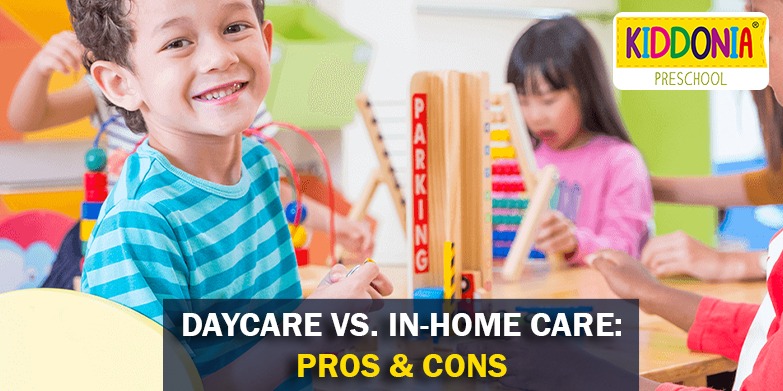Choosing childcare is a major decision for parents. Two common options are daycare centers and in-home care. Both options have their pros and cons, and the choice depends on individual family needs and preferences. In this article, we will discuss the pros and cons of daycare and in-home care.
- In Day Care:-
- Pros:
- Socialization: Daycare centers provide children with opportunities to socialize with other children their age. Children learn important social skills such as sharing, taking turns, and cooperating with others. This socialization also helps prepare children for school and other group settings.
- Structured Environment: Daycare centers offer a structured environment with planned activities and routines. This structure provides children with a sense of routine and stability, which can be beneficial for their development.
- Trained Staff: Daycare centers typically have trained staff members who have experience in early childhood education. These professionals can provide age-appropriate activities, learning opportunities, and guidance.
- Regulations: Daycare centers are regulated by the state, which ensures that they meet certain health and safety standards. This regulation can give parents peace of mind knowing that their child is in a safe and healthy environment.
- Flexibility: Daycare centers often offer flexible scheduling options to accommodate different family needs. This flexibility can be beneficial for parents who work long or irregular hours.
- Cons:
- Cost: Daycare centers can be expensive, and the cost varies depending on the location, the age of the child, and the number of hours needed. This cost can be a significant burden for families.
- Illness: Daycare centers can be a breeding ground for illness, and children are more likely to get sick when in a group setting. This can be challenging for parents who need to take time off work to care for their sick child.
- Limited Control: Parents have limited control over the care their child receives at daycare centers. They may not agree with the center’s policies or methods of discipline, and they may not have a say in the activities and curriculum provided.
- In-Home Care:
- Pros:
Familiar Environment: In-home care provides children with the comfort and familiarity of their own home. This can be beneficial for younger children who may have separation anxiety.
Personalized Care: In-home care allows for personalized care, and the caregiver can provide one-on-one attention to the child. The caregiver can also tailor activities and learning opportunities to the child’s individual needs and interests.
Flexibility: In-home care can offer flexibility in scheduling and hours, and parents can work with the caregiver to find a schedule that works for them.
Cost: In-home care can be less expensive than daycare centers, especially for families with multiple children. The cost can vary depending on the location and the level of care needed.
- Cons:
- Limited Socialization: In-home care may limit a child’s socialization opportunities with other children. Children may miss out on learning important social skills and may not be exposed to diverse experiences and perspectives.
- Limited Oversight: In-home care may not have the same level of oversight as daycare centers, and parents may not have access to the same health and safety regulations and standards.
- Limited Backup Care: In-home care may not offer backup care options, which can be challenging for parents who need to work or attend appointments.
- Limited Training: In-home caregivers may not have the same level of training and experience as daycare center staff, which can affect the quality of care provided.
- Conclusion
Thus both daycare centers and in-home care have their pros and cons. Daycare centers provide children with socialization opportunities, a structured environment, and trained staff. In-home care provides personalized care, flexibility, and a familiar environment.

